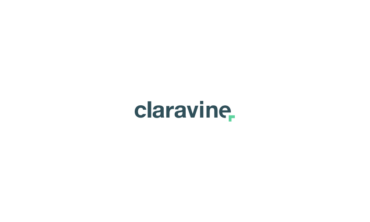Take a proactive approach to standards. Learn how we take the drama out of your marketing data.
- Compliant Naming
- Manage Campaign Data
- Improve Metadata
- Reduce Manual Entries
- Validate Tags
- Media Performance
- Fix Tagging Errors
- Clean & Deduplicate
- Generate Metadata
- View Assets in Datasets
- Validate Creative
- Data Layer Management
- Measure Creative ROI
- Accurate Tracking Codes
- Maintain Logic
- Manage Your Taxonomy
- Validate Tag Placement
- Increase Accuracy
- Automation
- Mobile Deep Link
- Generate QR Codes
- Collaboration
- Deliver More Metadata
Generate Compliant Naming & Tracking for Media
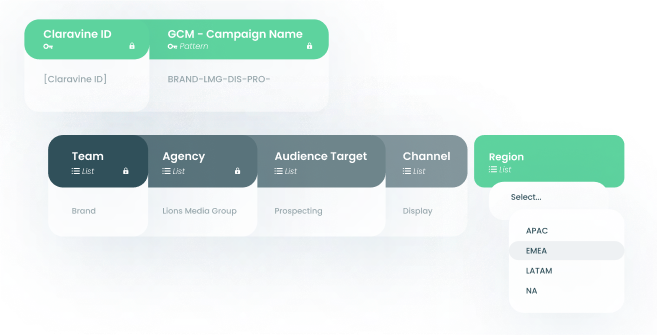
The Problem
Your media planners and buyers can do everything right, the creative can be perfect, and Ad Ops can do (almost) everything right. But if campaign, placement, or creative names are set-up incorrectly you won’t be able to effectively optimize your campaigns.
The Solution
Use our platform to define and apply standards to your campaign names. Ops can use this to generate names – or validate that names used in platforms are correct – then update as needed. Increase taxonomy compliance, prevent operational mistakes and misused budgets, and give data teams accurate data so they can generate actionable reports.
Centrally Manage Campaign Data for Media Buying
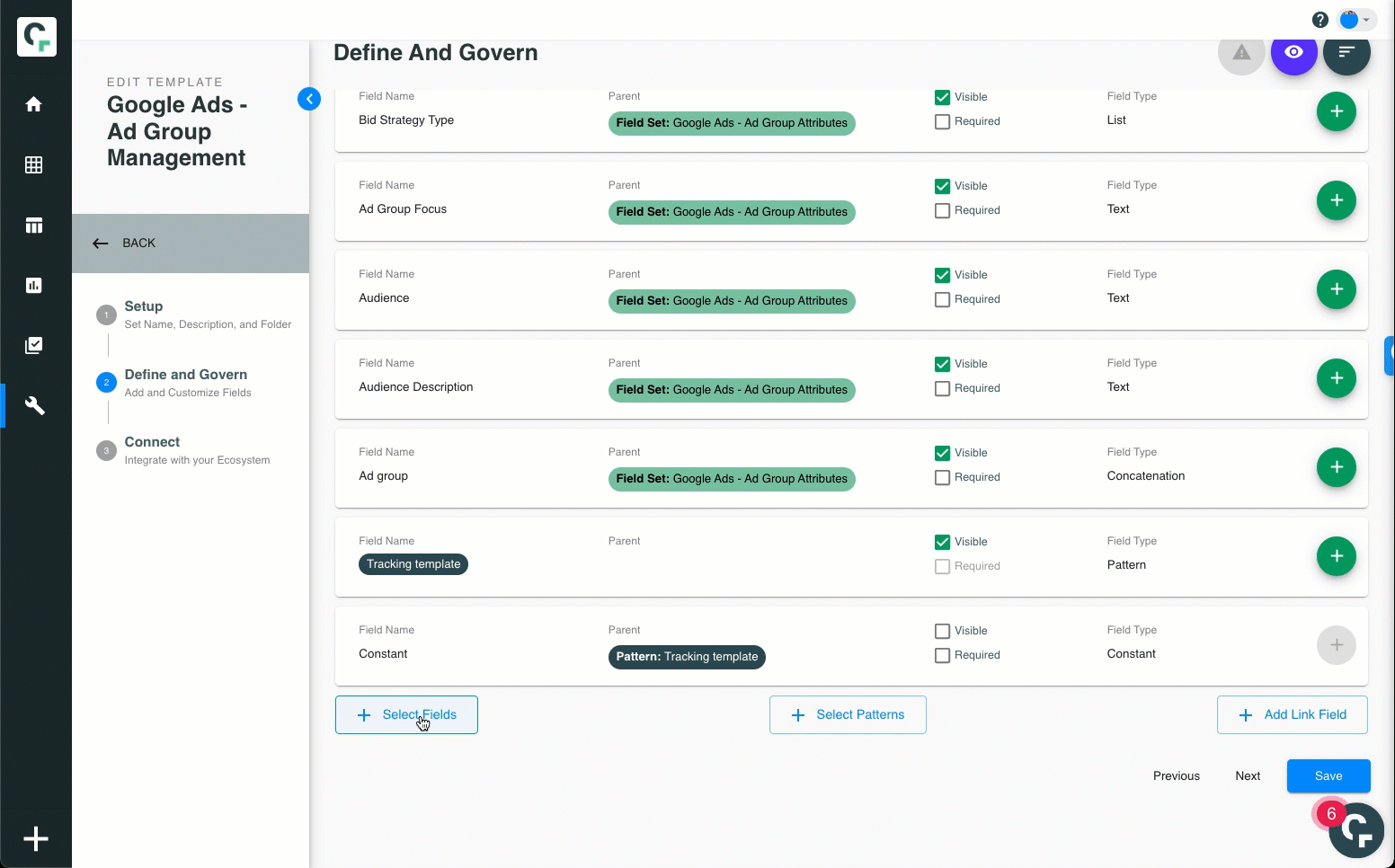
The Problem
Your ad operations teams are using outdated spreadsheets to generate naming conventions and metadata, leaving the analytics team’s data out of sync.
The Solution
Our platform gives you a central place to manage marketing data models and taxonomies. Define campaign naming standards – and other metadata needs – with customizations by team, region, or channel. Teams see only the data they need to, with guidance specific to their workflows so they input the right data every time.
Improve Metadata Quantity & Quality Across Ad Trafficking
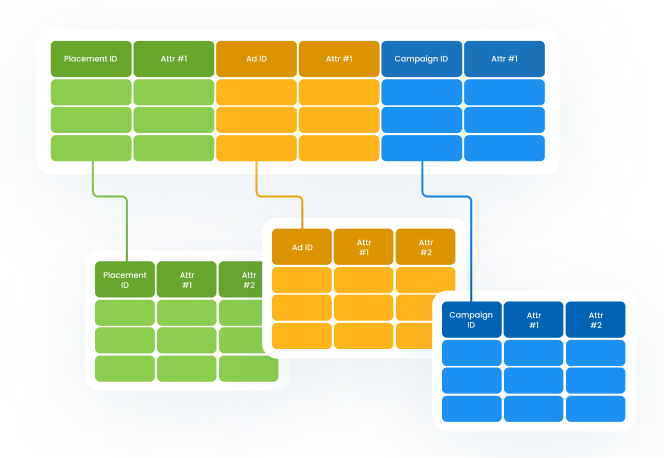
The Problem
Your teams need to connect media performance data across DSPs, Paid Social, Search, OTT, and your ad server, but the metadata to join these datasets is missing due to campaign configurations.
The Solution
We allow you to capture and associate a nearly unlimited number of metadata fields to your campaigns including platform specific identifiers. Not only can you ensure ops teams are adding the data you want, you can ensure it is being entered in a standardized way so data teams have exactly what they need for rich, dimensional analysis.
Reduce Manual Data Entry

The Problem
Your creative agency uses a different naming convention than your media operations teams making it difficult to ensure the right creative is used in the right campaigns.
The Solution
Our platform connects your teams through data. Templates can be connected so your teams can select from data that was generated upstream (like a creative ID for Ad Ops) while maintaining focus on their task at hand. This makes hand-offs easier and faster, and delivers more standardized, easy to connect data to analytics.
Validate Tag Placements and Configurations
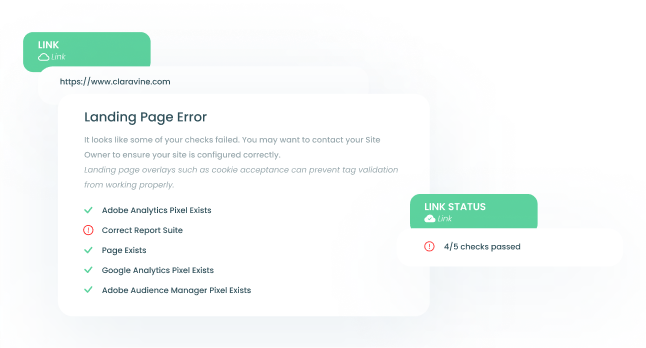
The Problem
When launching a marketing campaign, everything displayed correctly but you didn’t realize the marketing tags on your site or mobile app weren’t collecting the correct (or possibly any) data.
The Solution
Define and govern link configuration, requirements, and parameters in our templates. Then, validate tags in real-time, ensuring the right tags are firing and sending data to the correct destinations prior to launch, helping you spot and resolve errors sooner, faster, and at scale.
Compare Paid Performance to Other Channels

The Problem
Even when teams get naming and tracking right, siloed work leads to siloed data. And when the data you capture for each channel doesn’t line up, it’s next to impossible to compare your paid channels let alone to generate a more holistic view.
The Solution
We allow you to set standards from the start so every campaign – no matter the channel – has a common data model, allowing your analytics team to perform the measurement comparisons you need.
Identify and Fix Naming and Tagging Errors
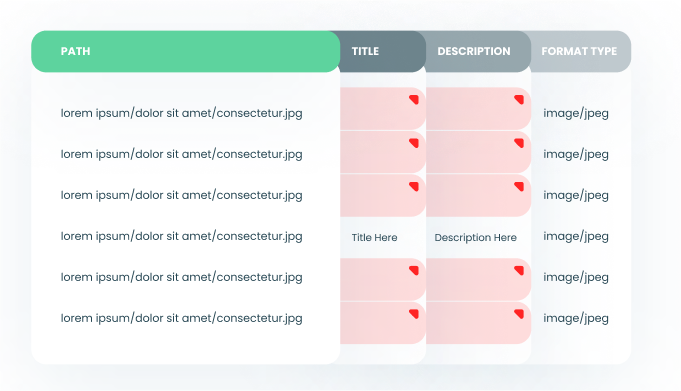
The Problem
Your creative team is creating duplicate assets because they aren’t able to find the right assets when searching in their DAM.
The Solution
Ensure every asset in your DAM has the correct name and metadata based on your defined taxonomy. Our platform allows you to quickly locate mistakes and fix them (in bulk) no matter the volume.
Improve DAM Organization
The Problem
“We have 12 of the same assets in our DAM but they’re all named and tagged differently!” Sound familiar? Stop wading through an asset mess. Search and discovery in your DAM depend on the completeness, consistency, and accuracy of metadata. If you have data that is missing, wrong, or misaligned, teams won’t find what they need and will rebuild content, wasting time and resources – and creating an asset mess.
The Solution
If you’re tired of wading through an asset mess, we can help! For a long time, Claravine has enabled validating and updating metadata from your DAM in bulk (including Adobe Experience Manager). In addition, you can further accelerate and improve tagging by using Content Comprehension to apply a common taxonomy across hundreds, or hundreds of thousands of assets all at once.
At the same time, we can generate a Content ID for an asset, which you can use to detect other assets with the same ID. Quickly sort IDs across your dataset and see – in ID form or using asset preview – all your duplicates at once. From there, you can update asset metadata or decide what clean-up might be needed. Quick Tip! Using Content IDs isn’t limited to assets within one system. You can perform this type of check across ALL your data or systems regardless of why you might want to see where similar assets exist (as long as that data is in Claravine’s platform).
Control the Application of AI-Generated Metadata
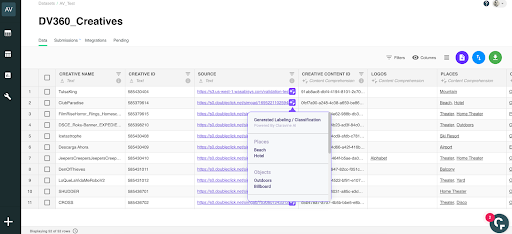
The Problem
You’ve invested in images and videos for content and creative, but you have little to no idea what your assets contain. Without detailed metadata describing the contents, it’s difficult to do any segmentation, measurement, or optimization.
The Solution
Rather than relying on inflexible built-in tools, control the application of AI-generated metadata with our Content Comprehension feature. Automatically classify and tag your assets with metadata aligned to industry standard taxonomies across brand safety, context, emotions, affinities, subject, objects, events, activities, places, and more, including custom models. And control this using your preferences for strength of association and precision. It’s simple – import your asset URLs, add additional metadata, then put these dimensions into action for activation, insights, and analysis..
Visualize an asset within your workflow
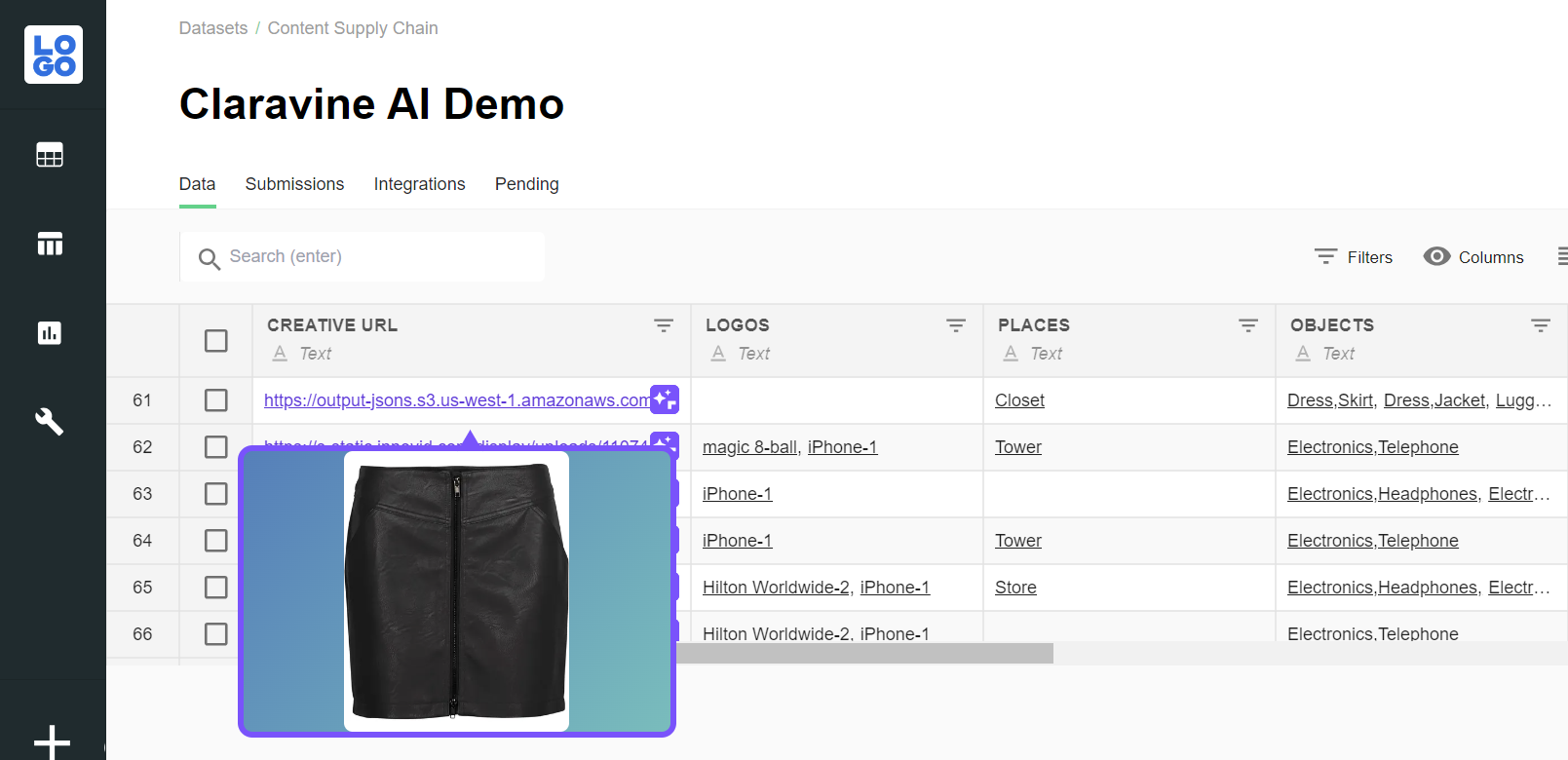
The Problem
You have a variety of assets being created and used across your marketing channels. However, you have little to no visibility into whether image 123 is what you think it is or wanted it to be. This leads to time-consuming manual checks within and across various systems and platforms and – if these checks don’t happen – costly mistakes.
The Solution
Immediately visualize an asset within your workflow across your entire dataset. By hovering over a creative asset URL, asset preview helps you to easily locate, validate, and compare the assets in your dataset to what you expect (or don’t) so teams can quickly prevent or minimize mistakes.
Validate Assets Across Trafficked Media

The Problem
Are you sure that the right assets were trafficked across your campaigns? Running campaigns with the wrong creative is costly, creates a poor customer experience, and wreaks havoc with reporting.
The Solution
Use the Content ID to quickly compare a creative used in your media & advertising platforms to the intended asset in your DAM or other system. This is even faster and more intuitive by using the asset preview to eyeball the creative as you compare. Finally, launch campaigns and measure with confidence.
Manage Your Data Layer
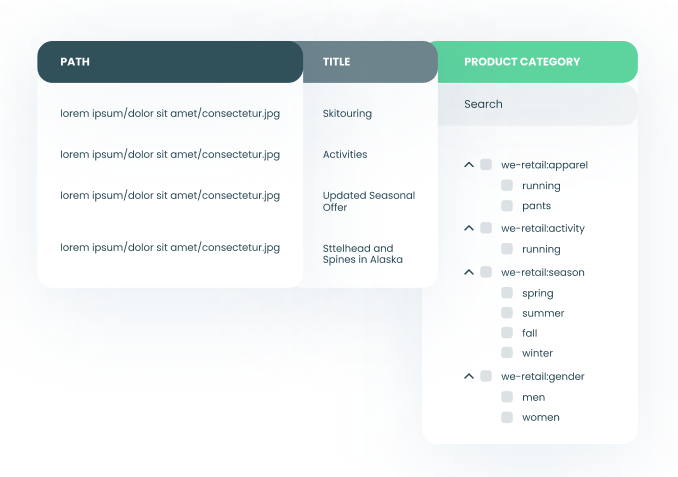
The Problem
Marketing, content, and business owners don’t have direct access to their content pages. Updating any metadata for SEO or analytics takes many days and limits impact to the business.
The Solution
Our platform gives your content teams a way to create and update content metadata in one central place, ensuring every piece of content has the right keywords, title, and metadata structure for richer analytics. Open this data up to collaboration and improve SEO, onsite search, and personalization.
Measure Creative ROI
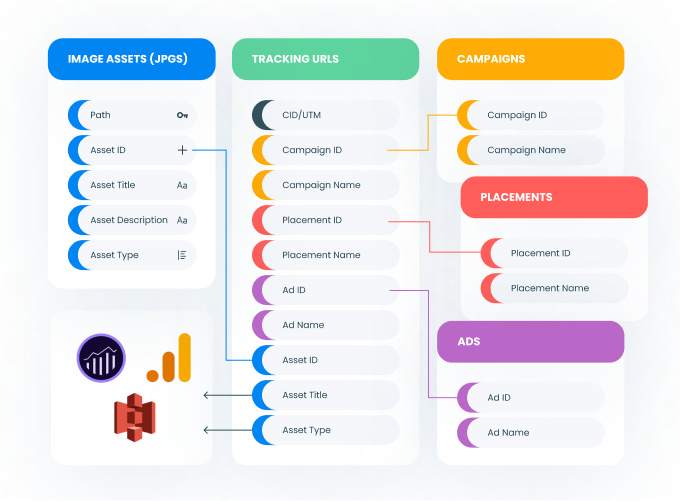
The Problem
You want to measure creative performance but creative metadata isn’t connected to media performance data.
The Solution
Our platform ensures the metadata tied to each type of ID – asset, creative, campaign, platform or more – is correct, complete and detailed. Manage an unlimited number of dimensions and maintain the links between these dimensions and your IDs, making it easy for data teams to join tables together and ultimately tell you what content or creative worked (or didn’t).
Generate Consistent, Accurate Tracking Codes
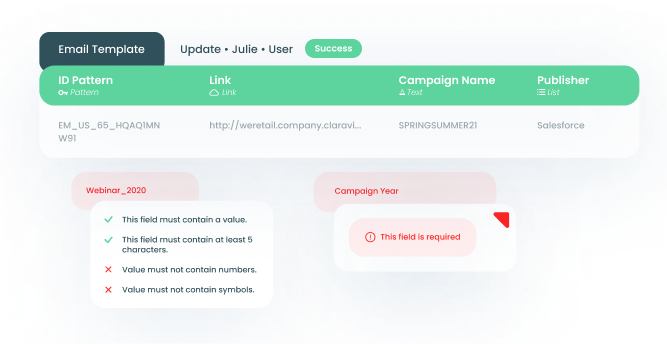
The Problem
Your teams are creating and managing campaign codes in a spreadsheet which creates a challenge for analytics teams to map codes to the correct analytics dimensions.
The Solution
We allow the creation of unique campaign codes to be used across all teams and customized to their unique workflows. By using our platform to create and manage codes you are able to control the mapping of metadata associated to your analytics and BI platforms in a complete and consistent manner with a single source of truth for metadata.
Maintain Business or Channel Logic in a Tracking Code

The Problem
Your marketing strategy and sensitive marketing data is visible to consumers and competitors because it is included in your tracking code.
The Solution
Create an abstraction layer from your tracking code and metadata.Our platform allows you to use templates to conceal campaign details and reduce character count in your links with an ID only your business understands. Configure your codes as an indecipherable string of characters while retaining rich campaign metadata behind the scenes, shareable to your downstream data and analytics solutions.
Manage Your Taxonomy and Changes To It

The Problem
You have different teams across geographies generating tracking codes in a variety of formats using different versions of metadata.
The Solution
Our platform gives you a central place to manage your marketing taxonomy and metadata. Define campaign tracking parameters – and other standards – with customizations by team, region, or channel. Teams see only the data they need to, with guidance specific to their workflows.
Validate Tag Placement and Configuration
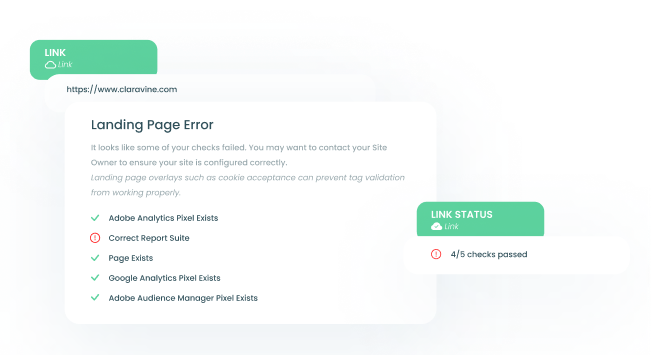
The Problem
When launching a campaign, everything displayed correctly but you didn’t realize the marketing tags weren’t collecting the correct (or possibly any) data.
The Solution
Define and govern link configuration, requirements, and parameters in our templates. Then, validate tags in real-time, ensuring the right tags are firing and sending data to the correct destinations prior to launch, helping you spot and resolve errors sooner, faster, and at scale.
Increase Accuracy and Detail of Data for Measurement
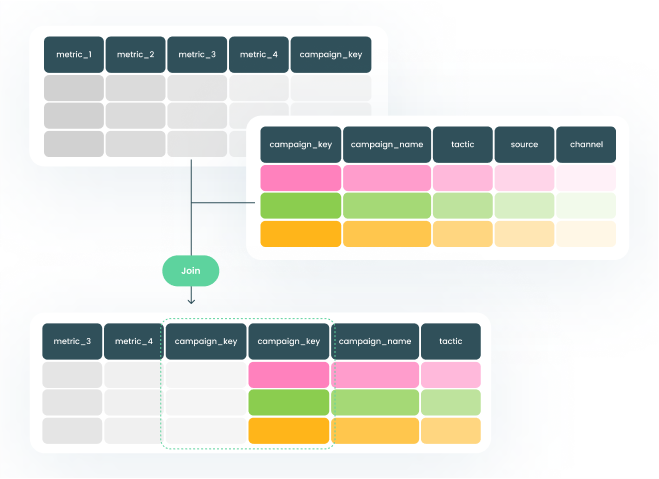
The Problem
You aren’t able to make fast business decisions due to analytics and performance data taking days or weeks to be validated and trusted.
The Solution
Our platform ensures the metadata tied to each marketing campaign, placement, creative, and link is right, complete and detailed – enriching tracking with the dimensions you need for more granular insights, more confident models, and more timely measurement. Manage an unlimited number of dimensions and associate each piece of information with an ID, making it easy for data teams to join various tables together.
Automate Valuable Metadata in Downstream Solutions
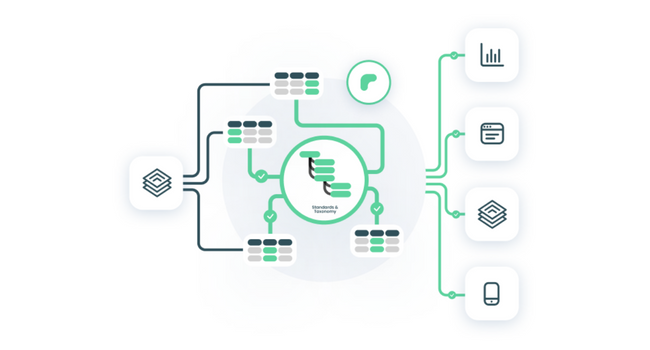
The Problem
Every day, week, and month your analytics teams are spending extra time cleaning up and preparing dashboards because the teams creating data are using different data models or metadata.
The Solution
We allow you to generate and store IDs to maintain a link between your campaign and any metadata you collect in our platform. Our pre-built connectors to data and analytics platforms allow you to get data wherever you need it, ensuring teams have access to it when they need it, and in the format they expect.
Create Consistent, Correct Mobile Deep Links
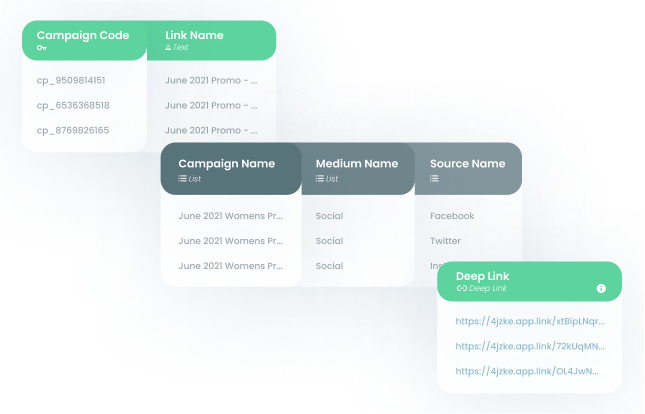
The Problem
Getting your mobile deep link metadata right across various apps is highly technical and complicated. And when you get it wrong, experience and mobile attribution suffer.
The Solution
Standardize deep link creation for consistent metadata for tracking across web and mobile app customer experience. Our platform’s simple link creation ensures customers get the right experience and all of your analytics teams receive the same metadata for measurement.
Generate Consistent, Correct QR codes

The Problem
Getting your QR code metadata right is highly technical and complicated. And when you get it wrong, customer experience and attribution suffer.
The Solution
Standardize QR code creation for consistent metadata for tracking across web and mobile app customer experience. Our platform’s simple QR code creation via pre-built connectors ensures customers get the right experience and all of your analytics teams receive the same metadata for measurement.
Help Mobile Teams and Agencies Work and Collaborate

The Problem
Your mobile teams can sometimes be your most siloed. And when they aren’t working from the same playbook, your customer experience and measurement suffer.
The Solution
Our platform gets everyone working together, and ensures data teams get what they need no matter the activation channel. Use our centralized tool to control what links people need to build and the respective data they need to add.
Deliver More Metadata to Analytics

The Problem
Mobile tracking and reporting is only getting harder. Your analytics teams constantly need to pivot while doing more with less.
The Solution
Creating links or QR codes in our platform improves accuracy, but also lets you enrich each campaign with the metadata your data teams need for easier, more insightful measurement.


